You might consider earning a masters in communication disorders if you are passionate about helping people better communicate.

In this type of program, your classes would focus on communication disorders and how to combat them. You could also engage in practical, supervised experiences that put your knowledge to the test and help prepare you for a career in speech therapy.
Editorial Listing ShortCode:
Professionals who hold a masters in communication disorders tend to pursue careers within the field of healthcare and therapy. Many seek licensure to become speech-language pathologists.
Masters in Communication Disorders Programs Online

A master’s in communication disorders helps you learn to identify and treat communication disorders in people of all ages.
Students who earn a masters in communication disorders typically want to work as speech-language pathologists. Others may pursue related roles associated with the field of communication disorders, such as clinical supervisors or education specialists.
Editorial Listing ShortCode:
The coursework for this type of graduate program reflects these goals. As a student undertaking a communication disorders masters, you may be exposed to subjects like:
- Various language disorders
- How to operate in a clinical environment
- Counseling
- Anatomy
- Physiology
- Traumatic brain injury and its effects on communication
In addition to classwork, your program may require you to complete clinical observations and externships. As a result, you could have practical experience under your belt before you graduate. This is essential if you seek to apply for a speech-language pathologist license, as most states require a certain number of hours of practice to become licensed.
Many graduates pursue licensure to become practicing speech-language pathologists. These professionals can work with both children and adults to help them overcome their communication difficulties. They assess the problems that their clients are facing and then create and carry out treatment plans to meet their patient’s goals for treatment.
Communication Disorders Careers & Salaries
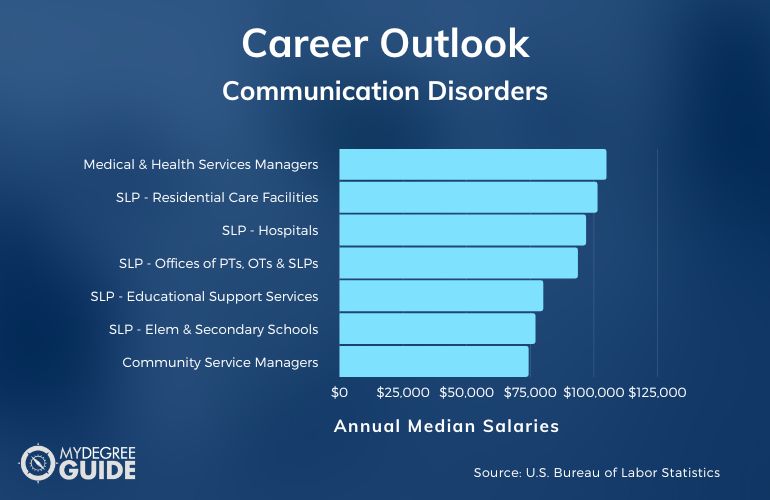
Earning a masters in communication disorders online may qualify you for a variety of occupations. Obtaining licensure and becoming a speech-language pathologist is the main career path for students who pursue this degree.
Editorial Listing ShortCode:
The Bureau of Labor Statistics projects 21% job growth for this occupation over the next ten years, which is much faster than average. According to the Bureau of Labor Statistics, here are the median salaries of potential careers associated with the advanced study of communication disorders.
| Careers | Annual Median Salaries |
| Medical and Health Services Managers | $104,830 |
| Speech-Language Pathologists — Nursing and Residential Care Facilities | $101,320 |
| Speech-Language Pathologists — Hospitals | $96,820 |
| Speech-Language Pathologists — Offices of PTs, OTs, SLPs, and Audiologists | $93,600 |
| Speech-Language Pathologists — Educational Support Services | $80,000 |
| Speech-Language Pathologists — Elementary and Secondary Schools | $76,940 |
| Social and Community Service Managers | $74,240 |
| Health Education Specialists | $59,990 |
| Hearing Aid Specialists | $59,020 |
| Healthcare Support Workers, All Other (Including SLP Assistants) | $40,420 |
If you do not want to become a speech-language pathologist, then you might consider other positions related to communication disorders. For instance, some graduates go on to work as speech teachers, research scientists, educational specialists, or clinical supervisors.
Communication Disorders Master’s Curriculum & Courses

Though there are differences in terms of course offerings and names between universities, here are some common classes that you may see in a masters in speech pathology program:
- Language Disorders: In this course or series of courses, you can learn how to identify and diagnose various language disorders.
- Clinical Methods: This class instructs students on how to operate in a clinical setting for communication disorders.
- Neural Origins of Communication Disorders: This class focuses on neurology and how communication disorders are linked to neurological processes.
- Communication Disorder Counseling: This class looks at how to counsel clients and their families struggling with communication disorders.
- Assistive Technology for Communication Disorders: This course overviews how to implement technology for patients who require multi-modal communication systems.
- Child Language Intervention: This course explores how to provide services for children and adolescents with communication disorders.
- Anatomy and Physiology: This course takes on the complex anatomy and physiology of both speech and hearing processes.
- Motor Speech Disorders: This class focuses on motor speech disorders and how to implement treatments for these types of conditions.
- TBI and Communication: This class specifically focuses on communication disorders caused by traumatic brain injury.
- Communication Disorder Research: This research-focused class introduces students to the procedures, methods, and theories behind conducting research in this field.
In addition to your coursework, you may also complete clinical observations and other forms of practical experiences to fulfill your degree requirements. Many masters programs also require students to complete a thesis.
MS in Communication Disorders Admissions Requirements

Each university will set its own requirements for admissions, but here are some common admissions criteria for masters programs:
- College transcripts. Most programs ask for full transcripts from previously attended colleges and universities.
- Resume or CV. This document will list all your work experience, education, and honors or various accomplishments.
- Personal statement. To get to know you better, programs may ask for a written response to a specific question.
- Letters of recommendation. Most programs ask for multiple letters of recommendation from professors or employers who know you well.
In addition, you may submit GRE or GMAT test scores, though this requirement is becoming less common.
Accreditation

In order to ensure that the education you’ll receive is of the highest quality and rigor, it’s beneficial to verify whether the universities you’re interested in are regionally accredited.
Editorial Listing ShortCode:
In the regional accreditation process, a regional accrediting agency reviews a school’s faculty and educational practices to measure their effectiveness. Earning your degree from an accredited university could be necessary to qualify for doctoral studies, licensure, or employment. Plus, some forms of financial aid are only available to students at accredited schools.
CAA-ASHA Accreditation
The Council on Academic Accreditation in Audiology and Speech-Language Pathology (CAA-ASHA) is the accrediting body for communication disorder programs.
This means CAA-ASHA ensures standards for audiology and speech pathology programs. They do this by requiring universities to submit annual reports of their audiology and speech pathology programs as well as reports for any changes to their programs. Enrolling in a CAA ASHA accredited program could help ensure you’re receiving an education that’s up to industry standards.
Communication Disorders Licensure and Certifications

Speech-language pathologists are required to be licensed in order to practice. Licensure ensures that practitioners meet all legal and educational standards for the speech pathologist profession.
All states require licensure for speech-language pathologists, but specific requirements can vary by state. Overall, licensing requirements tend to include holding a masters degree from an accredited program, completing supervised clinical hours, and passing an exam.
When choosing a communication disorders masters program, it’s beneficial to verify that a program meets the licensure requirements for your particular state.
Financial Aid and Scholarships
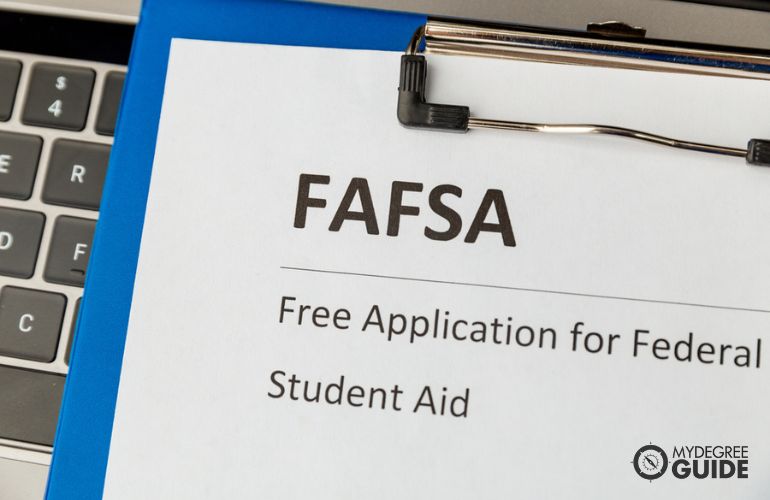
Federal aid, state aid, and scholarships make up the largest sources of financial aid for graduate students who qualify.
To see if you qualify for federal aid, you can fill out the Free Application for Federal Student Aid (FAFSA). State aid programs typically want to see your FAFSA results as well. The FAFSA often determines your eligibility for need-based aid.
Scholarship programs can be offered by universities, government organizations, or even private institutions. Employers may also offer tuition benefits to employees who are furthering their education.
What Is a Communication Sciences and Disorders Masters Degree?

A communication sciences and disorders masters degree is focused on teaching students how to become speech-language pathologists.
Students in these programs learn how to identify and treat various communication disorders that may arise throughout a person’s lifetime. In particular, you’ll focus on disorders that affect speech, language, and hearing abilities. Your program may also allow you to practice what you have learned in the classroom.
You may have the opportunity to apply your skills and education in clinical settings, working with patients in a supervised manner. Supervised clinical hours are a common requirement for SLP licensure. Most masters programs also include a thesis or capstone project.
What Can You Do with a Masters in Communication Disorders Degree?
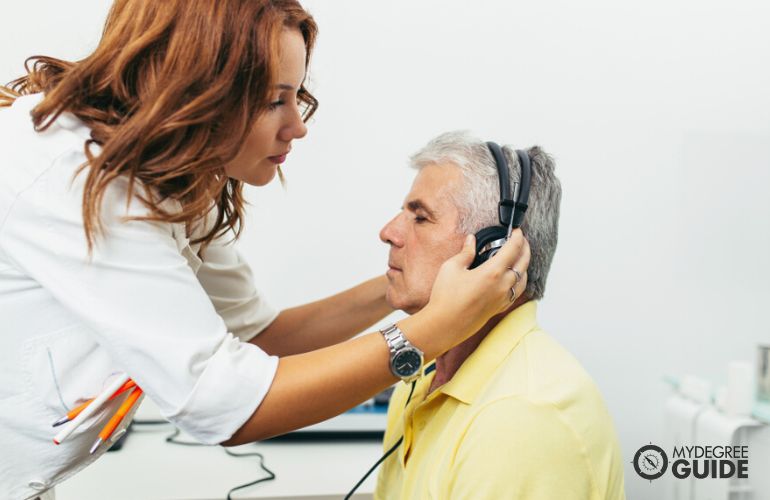
Becoming a speech-language pathologist is the most common career path for students who complete communication sciences and disorders graduate programs. Most programs are designed to fulfill licensure requirements for various states.
The Bureau of Labor Statistics predicts 21% job growth for this occupation over the next ten years, which shows that this sector is growing rapidly. Speech language pathologists can find work in a number of areas, including schools and healthcare settings.
Editorial Listing ShortCode:
Graduates may also pursue related roles as speech or hearing therapists, clinical supervisors, speech teachers, education specialists, or research scientists.
How Long Does It Take to Get an Online Masters in Communication Disorders?

The time it takes to complete an online SLP masters depends on a variety of factors, including your enrollment status and your university’s academic calendar.
If your program requires you to complete 36 credit hours and has no thesis requirement, then you may be able to finish in 1 year if you are enrolled full-time and take a class during the summer. A thesis requirement will add additional time to your program, as it entails conducting research and writing the thesis. Studying part-time could increase the overall time it takes to complete the degree as well.
Is a Masters in Communication Sciences and Disorders Worth It?

Yes, a masters in communication sciences and disorders is worth it for many students. An online communication disorders masters program helps you grow your knowledge and skill sets in the field. Most programs also help you qualify for state licensure as a speech-language pathologist.
Editorial Listing ShortCode:
Becoming an SLP is the most common career path for graduates. The Bureau of Labor Statistics projects that this occupation will grow by 21% over the next ten years, which is much faster than average. Communication disorder professionals may also work in related positions within the healthcare and education fields.
Universities Offering Online Masters in Communication Disorders Degree Programs
Methodology: The following school list is in alphabetical order. To be included, a college or university must be regionally accredited and offer degree programs online or in a hybrid format.

Baylor University offers an online Master of Science in Communication Sciences and Disorders. Baylor’s online program is designed to offer a Christian education and the same rigorous coursework that can be completed on campus. The program requires the completion of 375 hours of clinical placements and classes that meet in the evenings.
Baylor University is accredited by the Southern Association of Colleges and Schools Commission on Colleges.

California State University – Northridge offers a Master of Science in Communicative Disorders that is 100% online. Practicum requirements may be met at a local site. The program focuses on the requirements for licensure as a speech-language pathologist and for employment in public schools or clinical settings.
California State University – Northridge is accredited by the Western Association of Schools and Colleges.
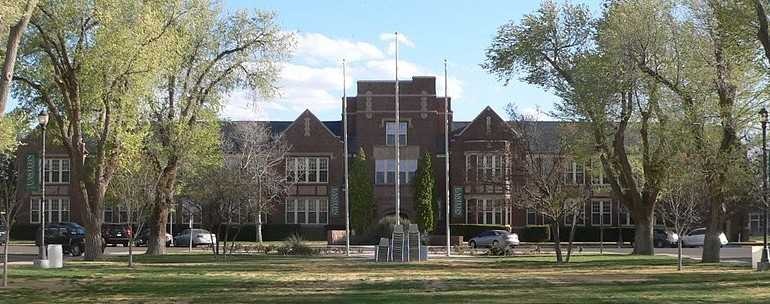
Eastern New Mexico University’s flexible Master of Science in Communicative Disorders program offers coursework both online and on campus. Courses are 16 weeks long during the fall and spring semesters, and summer courses are 8 weeks long. Previous graduates have had a high pass rate on the Praxis exam and high employment rates.
Eastern New Mexico University is accredited by the Higher Learning Commission.

Emerson College offers an online MS in Communication Disorders program, with courses taught by the same faculty members who teach on campus. The school boasts a close-knit community. Graduates of the program may pursue certification as speech-language pathologists. The program includes clinical training and emphasizes evidence-based practice.
Emerson College is accredited by the New England Commission of Higher Education.
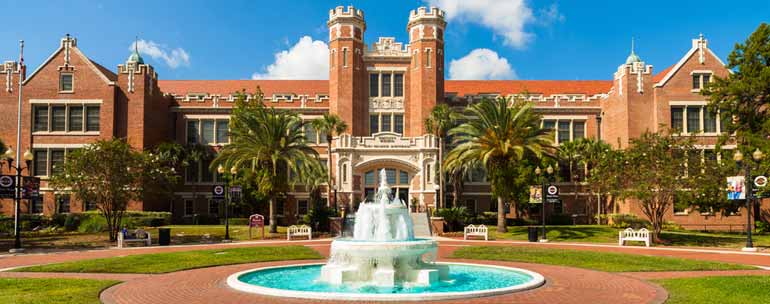
Florida State University offers a Master’s in Communication Science and Disorders through its distance education program. Classes are offered part-time in a completely online format while clinical experience may be gained through practicum placements locally. The application process does not require GRE scores.
Florida State University is accredited by the Commission on Colleges of the Southern Association of Colleges and Schools.

Minnesota State University – Mankato offers an MS in Communication Sciences and Disorders that is designed to lead to SLP licensure in the state of Minnesota. During the first year, students study on campus, and during the second year, classes are taken online while students do their internships.
Minnesota State University – Mankato is accredited by the Higher Learning Commission.

New York University offers an MS in Communicative Sciences and Disorders that can be completed online or on campus. This 48 credit program can be taken either part-time or full-time. It seeks to prepare graduates for speech-language pathologist licensure. The comprehensive curriculum provides clinical training for a variety of disorders and treatments.
New York University is accredited by the Middle States Commission on Higher Education.
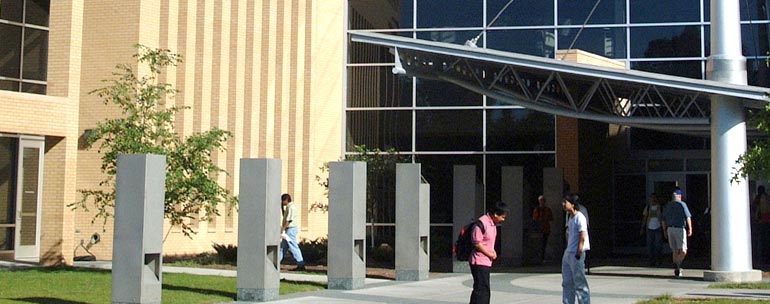
The MS in Communication Sciences and Disorders program at St. Cloud State University offers classes in on-campus, online, and synchronous online formats. Small class sizes help students build relationships with their classmates and gain one-on-one interactions with their professors. St. Cloud’s Speech-Language and Hearing Clinic provides opportunities to gain hands-on experience.
St. Cloud State University is accredited by the Higher Learning Commission.

The University of Georgia offers an MEd in Communication Sciences and Disorders. Practicum and internship opportunities are available both on and off campus. There is no requirement to complete a thesis. Graduates may pursue speech-language pathologist licensure and work in various educational and clinical settings.
The University of Georgia is accredited by the Southern Association of Colleges and Schools Commission on Colleges.

The University of Wisconsin – Eau Claire offers a Master’s in Communication Sciences and Disorders both online and on campus. The online program typically takes 3 years to complete, and the on-campus program usually takes 2 years to complete. Previous graduates of the program have had high employment success rates.
The University of Wisconsin Eau Claire is accredited by the Higher Learning Commission of the North Central Association of Colleges and Schools.
Getting Your Communication Disorders Masters Online

If you are wanting to help others overcome their speech impediments and communication disorders, then you might consider earning a masters in the field.
Completing a masters program in communication disorders can help you qualify for certification and licensure as a speech-language pathologist. Graduates may also pursue related careers in healthcare and education. Online learning formats could enable you to earn your graduate degree on a more flexible schedule. Online programming is especially beneficial for working professionals and students with other responsibilities.
You could start comparing accredited communication disorders masters programs online today to see which ones best align with your schedule and interests.

